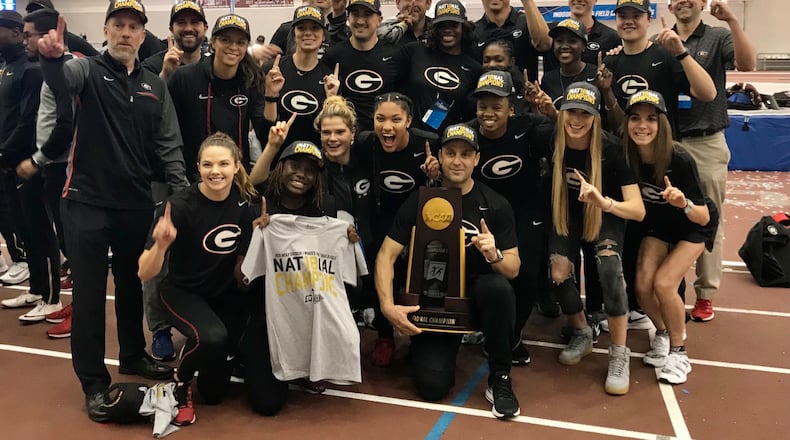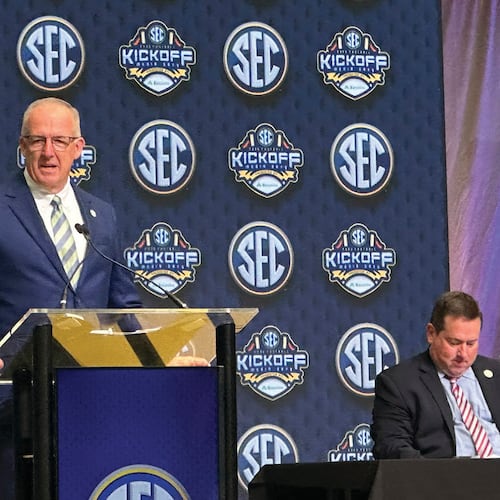ATHENS – Petros Kyprianou’s contract status is not listed on the agenda that UGA released in advance of the athletic association’s annual end-of-academic-year board of directors meeting set for Thursday morning in Greensboro. But you can bet it will be discussed within the various social settings that intersperse the three-day retreat at the Ritz Carlton Lodge on Lake Oconee.
Whether it gets resolved is anybody’s guess.
Negotiations between the athletic department and its highly successful track coach have reached an impasse. That has nothing to do with Kyprianou’s compensation – which is more than $400,000 a year -- but it has everything to do with money. His contract expires June 30.
Kyprianou, who led the Bulldogs to a women’s and men’s national championship in 2018, wants an indoor track facility for his program.
“For what he’s done for our program, a couple of national championships and in the top five and top three and all, we probably have the worst facilities of anybody in the SEC,” former UGA track coach Lewis Gainey said. “South Carolina has an indoor facility now. Not everybody does. But I know for a fact Petros has always wanted one, for recruiting and everything else.”
All indications are he’s not going to get one, at least not soon.
UGA’s athletic department simply is committed to too many other facility projects that have precedence at the moment. Most notable is the $80 million football operations building that has been added to the Butts-Mehre complex. Phase 1 of construction was completed this month, and contractors are scrambling to get the 160,000-square foot facility up to code for full-time occupation before June 1. It also is not paid for yet and won’t be for at least five years. Georgia has, however, collected pledges from donors for at least 75% of the cost.
Meanwhile, Georgia tennis has dibs on the next big facilities project. While the netters just completed their first season of use in their new $8 million outdoor stadium, that’s just the beginning of what the Bulldogs are having to do to bring the Dan Magill Tennis Complex up to speed. Once known as the “Mecca of College Tennis” because it once hosted the NCAA Tennis Championships annually and 28 times overall, Georgia fell out of the rotation after 2017 because of inadequate facilities. UGA since has been awarded the 2026 tennis championships, but that’s predicated on having six new indoor courts by then. Georgia is in the process of raising money for a new $18 million indoor facility to build on the site of the Lindsey Hopkins Indoor Courts, which houses only four courts with very poor spectator sight lines.
Construction is contingent upon raising at least $12 million from donors. Any remainder would come from UGA’s reserve.
In the meantime, Georgia’s baseball facilities are deficient compared with the majority of SEC programs. That’s part of the reason coach Scott Stricklin accepted a recent contract extension that did not include a pay raise. He would rather see UGA make improvements to Foley Field and the surrounding practice areas over the next few years. There allegedly are tentative plans to that.
That reserve fund most certainly will be discussed in the official minutes by board treasurer Ryan Nesbit during the financials presentation. At last check, the Bulldogs had $65 million in unallocated funds – more than $100 million total -- in the reserve accounts maintained by the University of Georgia foundation.
That’s likely the money that Kyprianou is eyeing. But between committed projects and the budget shortfalls because of the coronavirus pandemic, those funds are unlikely to be accessed for such a project.
Georgia did a good job of mitigating the revenue shortages created by a limited football schedule and reduced seating. Originally projected as a $55 million shortfall, UGA was predicting something in the area of $30 million at the winter meeting. A final number will be shared at Thursday’s board meeting. That was further mitigated earlier this month when the SEC distributed a supplemental payout of $23 million to each of the 14 SEC schools.
But what Kyprianou wants is extremely expensive: A free-standing indoor building that would include a banked track, grandstands and coaches’ offices. Such a facility would require more land than exists on the existing site of Spec Towns Track, which is land-locked on Lumpkin Street. So, land would have to be purchased elsewhere, likely somewhere on South Milledge Avenue near the soccer and softball complex. Preliminary estimates show a cost of more than $30-40 million.
Georgia initially explored including an indoor track to be incorporated within the William Porter Payne and Porter Otis Payne Indoor Athletic Facility that houses Georgia’s indoor football field. But that plan was nixed because of the lack of space to incorporate both what track wanted and football required. The compromise was a 65-meter sprint track and jumping pits, which has gotten limited use since the building was opened in January 2017.
It’s not like Brooks is not supportive of the track program. On the contrary, he was the sport’s facilitator before assuming athletic director duties in January, and his oldest son is a budding track star.
Brooks won’t discuss the issues publicly until the season is complete, which will come in late June after the NCAA Championships.
“Our primary focus at this time is supporting our coaches and student-athletes as they prepare for NCAA regionals and nationals,” he said in a released statement.
In a nutshell, it’s complicated. And it’s not likely to get resolved over the next couple of days. Perhaps some plans could be hatched around the fire pits on the Ritz property where UGA board members traditionally gather for s’mores or a nightcap during this retreat.
“It’s salvageable at this point,” one board member insists.
Kyprianou no doubt noticed the goings on of other spring sports on campus this month. Georgia men’s and women’s tennis teams each hosted an NCAA regional earlier. Both advanced to the NCAA Championships.
Coach Lu Harris-Champer’s softball team -- somewhat controversially -- was named a regional host last weekend, largely based on its fine facility and reputation for being exceptional hosts. The Bulldogs knocked off top-seeded Duke and advanced to Friday’s NCAA Super Regional at Florida.
Being able to host NCAA events is a big advantage in college athletics. Costly, too.
About the Author
Keep Reading
The Latest
Featured



